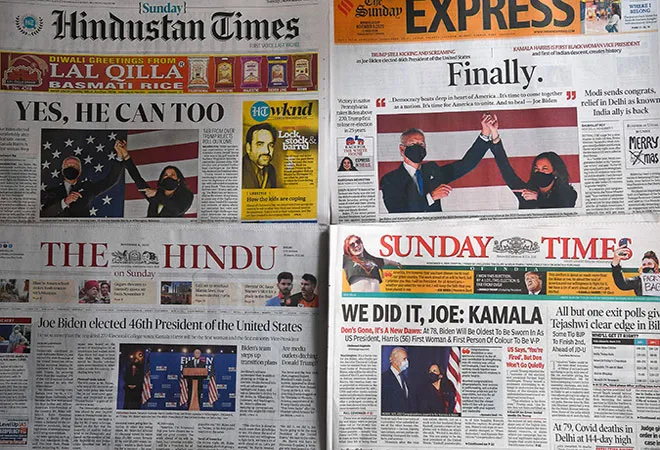-
CENTRES
Progammes & Centres
Location
U.S. defense cooperation with India is one thing Democratic and Republican administrations agree on.

U.S. President-elect Joe Biden is a known quantity in India. He has long championed strong ties with the country and, as part of the Obama administration, was instrumental in putting the relationship on a good trajectory in those years. As far back as 2006, in fact, Biden argued that the United States’ partnership with India was the one Washington most needed to get right—for its own safety.
As president, Biden will likely be able to deliver when it comes to India. In more ways than one, good ties with New Delhi enjoy a strong bipartisan consensus in the U.S. political establishment. From President George W. Bush to Barack Obama and then to Donald Trump, successive administrations on both sides have contributed toward a robust relationship—particularly because, as the center of global political and economic gravity shifts to the Indo-Pacific, India and the United States enjoy an unprecedented convergence of interests.
In all this, defense ties have been key. It was the Obama administration that named India a Major Defense Partner, and as a result of that India is now treated on par with America’s closest allies in the sharing of sensitive technologies. Obama also pushed hard for the signing of further defense agreements, which the Indian government was not ready to pursue until Prime Minister Narendra Modi assumed power in 2014. The most recent pact, the Basic Exchange and Cooperation Agreement for Geo-Spatial Cooperation on the sharing of geospatial intelligence and information, was signed just last month. The importance of such agreements cannot be overestimated at a time when India is engaged in a higher number of military exercises with the United States than with any other country, and both are cornerstones of the Quadrilateral Group (made up of them and Australia and Japan) in the Indo-Pacific.
Meanwhile, defense trade between the two countries has been growing and has recently exceeded the $20 billion mark. As India continues to work to diversifying its defense supplies to reduce dependence on Moscow, and as the United States beefs up its partnerships with like-minded nations in the Indo-Pacific, both could benefit by working together. India is keen to ensure that major defense manufacturers set up production facilities in India as part of its “Make in India” initiative to boost domestic manufacturing, and American defense manufactures could profit, as well, from such partnerships.
After taking office, the Biden administration might find that defense engagement is the most robust element of an increasingly multifaceted Indo-U.S. partnership and will, in all probability, build on it. That might entail not only facilitating more robust defense cooperation in the Indo-Pacific but also ensuring that the defense industries of the two nations work more closely in sharing technologies and building capacities.
This commentary originally appeared in Foreign Policy.
The views expressed above belong to the author(s). ORF research and analyses now available on Telegram! Click here to access our curated content — blogs, longforms and interviews.

Professor Harsh V. Pant is Vice President – Studies and Foreign Policy at Observer Research Foundation, New Delhi. He is a Professor of International Relations ...
Read More +